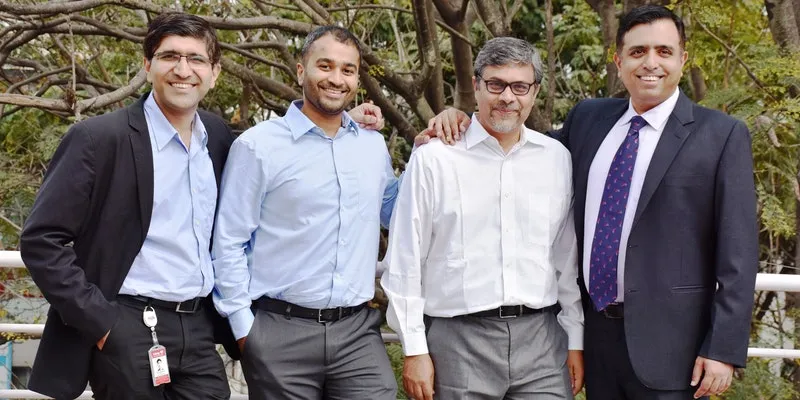[World Heart Day] These startups are providing tech solutions for better diagnosis and treatment of cardiovascular diseases
On the occasion of World Heart Day, YourStory brings to you a list of startups that are building solutions to solve issues related to cardiac health.
Cardiovascular diseases (CVDs) are reportedly the leading cause of death across the world, claiming 18.6 million lives every year.
While it is very important to have a healthy heart, we are seeing an increase in the number of CVDs across the world due to factors such as smoking, unhealthy diets, and stress.
The situation has worsened for people suffering from CVDs amid the pandemic as they are more vulnerable to the infection.

Representational Image [Image Credit: Shutterstock]
According to data by the Global Burden of Disease study, it is estimated that the standardised CVD death rate in India is 272 per 100,000 people, higher than the global average of 235 per 100,000 people.
In a bid to inform people and help them take care of their hearts, World Heart Federation has been observing September 29 as World Heart Day. It is a global campaign to help people take precautions against heart diseases.
With digital and technological disruption in the Indian healthcare sector, there are several startups building tech solutions to help in the faster diagnosis of CVDs, monitor conditions, and help people take care of heart health.
On the occasion of World Heart Day, YourStory brings to you a list of startups that are building solutions to solve issues related to cardiac health.
Tricog Health
Bengaluru-based Tricog Health provides virtual cardiac diagnostic tools and services with an aim to deliver high-quality cardiac care.
Founded in 2014 by Dr Charit Bhoraj, interventional cardiologist; Zainul Charbiwala, electrical engineer; and technologists Udayan Dasgupta and Abhinav Gujjar, Tricog leverages its deep medical and technology expertise to provide virtual cardiology services to remote clinics, powered by AI and medical experts.
Tricog’s flagship product InstaECG is a cloud-connected device that quickly interprets and analyses an ECG report. Using the application, users can receive cardiologist-certified ECG reports within 10 minutes.
Apart from this, Tricog also offers an InstaEcho platform to provide quick echocardiogram diagnoses. It uses AI to enable point-of-care cardiac ultrasound for the diagnosis of heart diseases such as heart failure, valvular heart disease, and screening for congenital heart disease. It claims to provide digitally certified reports within few hours.
Tricog is currently awaiting USFDA approval for its proprietary DeepRhythm platform for real-time patient monitoring.
Tricog raised $10.5 million in Series B funding last year. Prior to this, in 2016, the startup raised an undisclosed amount in Series A funding from Inventus Capital Partners, Blume Ventures, and other angel investors.

Tricog Founders (L-R): Dr Zainul Charbiwala, Abhinav Gujjar, Dr Udayan Dasgupta, and Dr Charit Bhograj
Monitra Healthcare
Hyderabad-based medtech startup Monitra Healthcare is developing monitoring solutions for cardiac-related problems and helps doctors diagnose heart conditions faster.
Founded by Aparna and Ravi Bhogu in 2016, Monitra’s flagship product upBeat is a non-invasive, band-aid-like patch with biosensors that can be worn by the patients on their chest to record their heart rhythms.
This data is then recorded onto a cloud, run through analytics, and manually assessed by the startup’s technicians before a report is generated to the doctor or patients.
In a previous interaction with YourStory, co-founder Aparna revealed that the product has been used by more than 800 patients across age groups.
Incubated at T-Hub, Monitra has received Biotechnology Ignition Grant (BIG) and SPARSH grants from Biotechnology Industry Research Assistance Council (BIRAC). The startup also received a grant from the United States–India Science & Technology Endowment Fund (USISTEF) as well.
Jeevtronics
Pune-based Jeevtronics was founded in 2013 by entrepreneurs and childhood friends Ashish Gawade and Aniruddha Atre to help save people suffering from sudden cardiac arrests through its dual-powered defibrillator.
According to a report by Arrhythmia and Electrophysiology Review (AER), sudden and unexpected cardiac death is the most common cause of death across the world. Patients suffering from sudden cardiac arrests generally need to be treated using defibrillators to restore their heartbeat.
In a previous interaction with YourStory, Ashish had said, “Sudden cardiac arrest is such a dangerous condition that it can kill the patient in 10 minutes. At that time, a defibrillator is used to provide electric shocks to restore heartbeat, and at that time, the hospitals will need rock solid electricity to ensure emergency care.”
To address this issue, Jeevtronics provides a battery-less, hand-cranked defibrillator named SanMitra 1000 HCT, which can be powered by electricity as well as manually.
SanMitra, which can fire up to 16,000 electric shocks, can be immediately powered by medical staff using a hand-crank generator in case of power failure. The product is especially helpful for hospitals from rural regions where continuous electricity might not be available.
The product has been deployed across many hospitals and COVID training centers across Maharashtra, including AIIMS Nagpur, CPR Hospital Kolhapur, Sassoon Hospital, and Sub District Hospital Manchar. Their device is also being used in Gujarat, Haryana, Tamil Nadu, and Rajasthan.

Image Credit: Jeevtronics
Sunfox Technologies
Dehradun-based Sunfox Technologies is aimed at providing monitoring solutions to help people understand any heart abnormalities early on.
Entrepreneurs Rajat Jain and Arpit Jain started up in 2016 after Rajat lost his friend to a sudden cardiac arrest. The duo realised the current available cardiac monitoring point of care (PoC) devices for last-mile users are costly, complex, inefficient, inadequate, inconvenient, and non-portable.
The startup is solving the problem through its flagship product named Spandan ECG, a lightweight and portable device that can even fit into one’s pocket. The monitoring device can detect heart anomalies and provide a detailed report on the condition.
In an earlier interaction with YourStory, Rajat explained that cardiac patients can screen themselves using the device while sitting at home and get alerted about any cardiac abnormalities instantly without medical assistance.
He explained that users will need to download the app and place electrodes of the device on their chest to get readings. The diagnosis result is stored on the mobile phone. This report can then be shared with the doctors or medical professionals. Using the data, the doctors can also consult the patients remotely if needed.
The Spandan device, which is priced at Rs 8,000, can detect up to 12 heart dysfunctions.
YourStory’s flagship startup-tech and leadership conference will return virtually for its 13th edition on October 25-30, 2021. Sign up for updates on TechSparks or to express your interest in partnerships and speaker opportunities here.
For more on TechSparks 2021, click here.
Edited by Megha Reddy


![[World Heart Day] These startups are providing tech solutions for better diagnosis and treatment of cardiovascular diseases](https://images.yourstory.com/cs/2/b094ec506da611eab285b7ee8106293d/World-Heart-Day1-1632826384307.png?mode=crop&crop=faces&ar=2%3A1&format=auto&w=1920&q=75)

![[YS Exclusive] OYO IPO: No major investors will dilute its stakes, IPO worth $1-1.2B likely to launch at end of this year](https://images.yourstory.com/cs/2/70651a302d6d11e9aa979329348d4c3e/11-1629370862430.png?fm=png&auto=format&h=100&w=100&crop=entropy&fit=crop)




